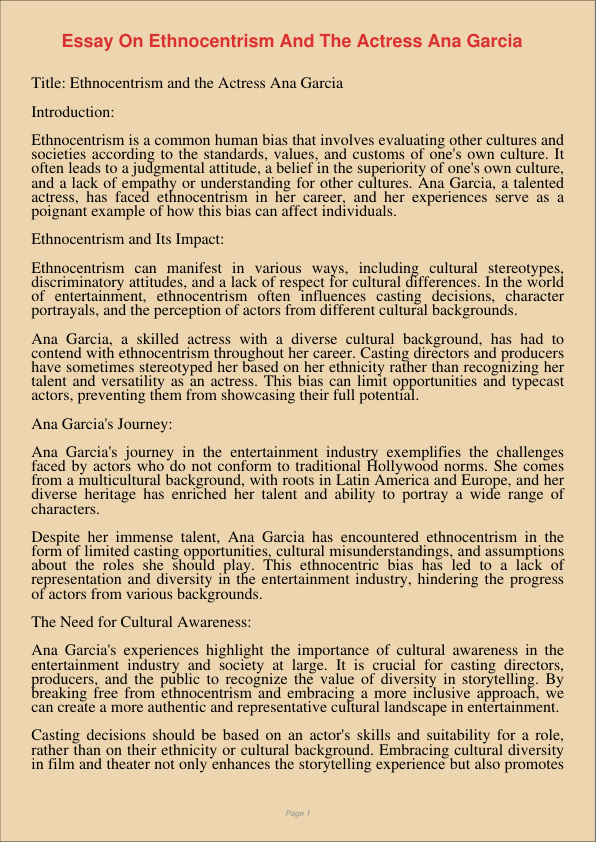Title: Ethnocentrism and the Actress Ana Garcia
Introduction:
Ethnocentrism is a common human bias that involves evaluating other cultures and societies according to the standards, values, and customs of one’s own culture. It often leads to a judgmental attitude, a belief in the superiority of one’s own culture, and a lack of empathy or understanding for other cultures. Ana Garcia, a talented actress, has faced ethnocentrism in her career, and her experiences serve as a poignant example of how this bias can affect individuals.
Ethnocentrism and Its Impact:
Ethnocentrism can manifest in various ways, including cultural stereotypes, discriminatory attitudes, and a lack of respect for cultural differences. In the world of entertainment, ethnocentrism often influences casting decisions, character portrayals, and the perception of actors from different cultural backgrounds.
Ana Garcia, a skilled actress with a diverse cultural background, has had to contend with ethnocentrism throughout her career. Casting directors and producers have sometimes stereotyped her based on her ethnicity rather than recognizing her talent and versatility as an actress. This bias can limit opportunities and typecast actors, preventing them from showcasing their full potential.
Ana Garcia’s Journey:
Ana Garcia’s journey in the entertainment industry exemplifies the challenges faced by actors who do not conform to traditional Hollywood norms. She comes from a multicultural background, with roots in Latin America and Europe, and her diverse heritage has enriched her talent and ability to portray a wide range of characters.
Despite her immense talent, Ana Garcia has encountered ethnocentrism in the form of limited casting opportunities, cultural misunderstandings, and assumptions about the roles she should play. This ethnocentric bias has led to a lack of representation and diversity in the entertainment industry, hindering the progress of actors from various backgrounds.
The Need for Cultural Awareness:
Ana Garcia’s experiences highlight the importance of cultural awareness in the entertainment industry and society at large. It is crucial for casting directors, producers, and the public to recognize the value of diversity in storytelling. By breaking free from ethnocentrism and embracing a more inclusive approach, we can create a more authentic and representative cultural landscape in entertainment.
Casting decisions should be based on an actor’s skills and suitability for a role, rather than on their ethnicity or cultural background. Embracing cultural diversity in film and theater not only enhances the storytelling experience but also promotes a more inclusive and understanding society.
Conclusion:
Ethnocentrism is a deeply ingrained bias that affects individuals from various cultural backgrounds. Ana Garcia’s journey as an actress serves as a powerful example of the impact of ethnocentrism in the entertainment industry. Her experiences reflect the need for greater cultural awareness, inclusion, and diversity in casting and storytelling.
By recognizing and addressing ethnocentrism, we can create a more equitable and enriching environment in the entertainment industry. Ana Garcia’s talent, combined with a shift towards greater cultural understanding and representation, can pave the way for a more inclusive and culturally rich future in the world of acting and beyond.

「真诚赞赏,手留余香」
真诚赞赏,手留余香
使用微信扫描二维码完成支付
